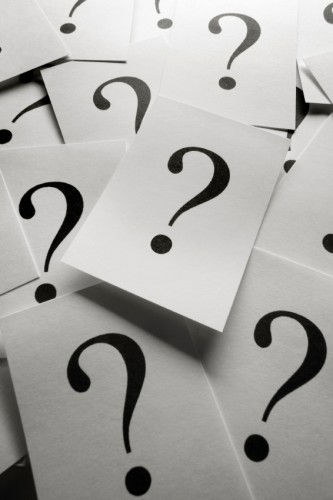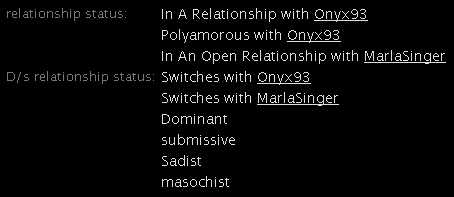Onyx and I have settled in to a remarkably comfortable D/s dynamic. We have talked extensively about it, but the difference this time is that it just clicks, for lack of a better term. All the background issues that were making so much noise the last time we were trying these power roles have been resolved, thanks in large part to the many things we learned through the trial of the triad. I find myself enjoying to do things for him, and he is now more able to push and guide me than he was before. It is, in a word, wonderful.
I have noticed that I am hesitant to share this power dynamic with others, even on here to an extent. I believe this is in part due to it still, in some ways, being so new and foreign but mostly it is because it is still private and vulnerable. Despite the abundance with which I share my private feelings and thoughts on this blog (less so now than I have before, but I’m working on writing more when I don’t have writer’s block) I have an extremely difficult time sharing personal things with others, especially in person and especially those I don’t know very well. Hell, I even have trouble expressing things to Onyx sometimes which I would have no issue writing to him.
The last couple of weekends while going out with amazing people I’ve noticed myself being slightly more comfortable but still not all that comfortable with expressing my submissiveness, and that was with fellow kinky perverted people who have read my blog including stories of me being slapped and dominated and fucked. I don’t mean showing my submissvieness to them, but just talking about it.
I see others so secure in their submission and happy to proclaim to the world that they are submissive and I find myself having trouble with that. Perhaps it is because I am a switch. I can’t fully embrace my role as submissive because, although I feel submissive to Onyx, I do not feel wholly like a submissive. I cannot throw myself into submission with complete abandon because I am also a Top. Or, that is the roadblock I come to in my mind.
Although I don’t consciously think this is true, there is a part of me that thinks embracing submission fully would mean giving up the parts of myself that are not submissive. Call it internalized binary programming that says I have to be one or the other but never both. The way some people say someone can’t feel Dominant and submissive at the same time, but I highly disagree, I say I am always both and it is the people I am with and situations I am in that bring each out in me.
However, I don’t have any hesitations about expressing my dominant side. I think in part this is because it is less vulnerable, less private, in a way. I am more comfortable with it, but also because it seems to be less normative. It’s more “okay” to express because it somehow shakes up the expectations.
I feel the same way with sexuality and gender, I’m far more comfortable expressing my desires when they have to do with cis-females or trans-people than when they have to do with cis-males. Essentially, I’m far more comfortable expressing my queer sexuality than what would be seen as a hetero-sexuality, as if expressing desire for cis-males somehow makes me less queer. Of course, in some minds it does. In some minds it would completely invalidate any other expression of queerness.
Similarly with gender I have been desiring lately to express my masculine side, the personae (yes, plural) I designate as Quyn or Sebastian sometimes. I used to dress more masculine and drifted to the feminine and now I’m working on finding the way to be both or neither, to dress as I please. While I’m more comfortable expressing my femme drag queen gender identity I think because that, in some ways, is the one that is less normative, despite being assigned female at birth, but that’s a whole other post.
Perhaps in the same vein expressing submissive desires could somehow invalidate any expression of dominance. I’m not saying this is the case, but I do think that Aristotelian logic is so ingrained in our culture that it is difficult to work against. If we express ourselves as being on one side of a cultural binary we are not only saying what we are but we are saying what we are not. By this logic when I say I am submissive I’m also saying I’m not dominant. It works for everything, really: power, sexuality, gender, etc. All the identities I hold middle ground on, certainly, and others as well.
I’ve talked about this many times before, I know, and read about the phenomenon. It’s not new, but it is significant. The point I’m trying to make here, though, is that I’m more comfortable expressing one aspect but not another on these supposed binaries (and I should point out that I do not see power dynamics or sexualities as part of a binary system, but they are largely seen culturally to be so which makes operating outside of them difficult and that is why I am referring to them as binaries), and my comfortability seems to be backwards. I am comfortable expressing the non-normative desires, those outside what is culturally expected, when it’s usually (or so I think) the opposite.
I want to be just as comfortable expressing and embracing all of my identities, and the first step just like with anything is acknowledgement. I have internalized binary and aristotelian logic programming. I have internalized power dynamic programming. I can actively work on acknowledging this programming and work to move beyond it, and that’s what I’m trying to do. Instead of thinking of these socially contrary ideas in terms of conflict and feeling dissonance over them I want to get to a point of doublethink, where I am comfortable with embracing these identities that seem to be contradictory and am, further, comfortable in my own skin. That’s what it’s all about in the end, anyway.


